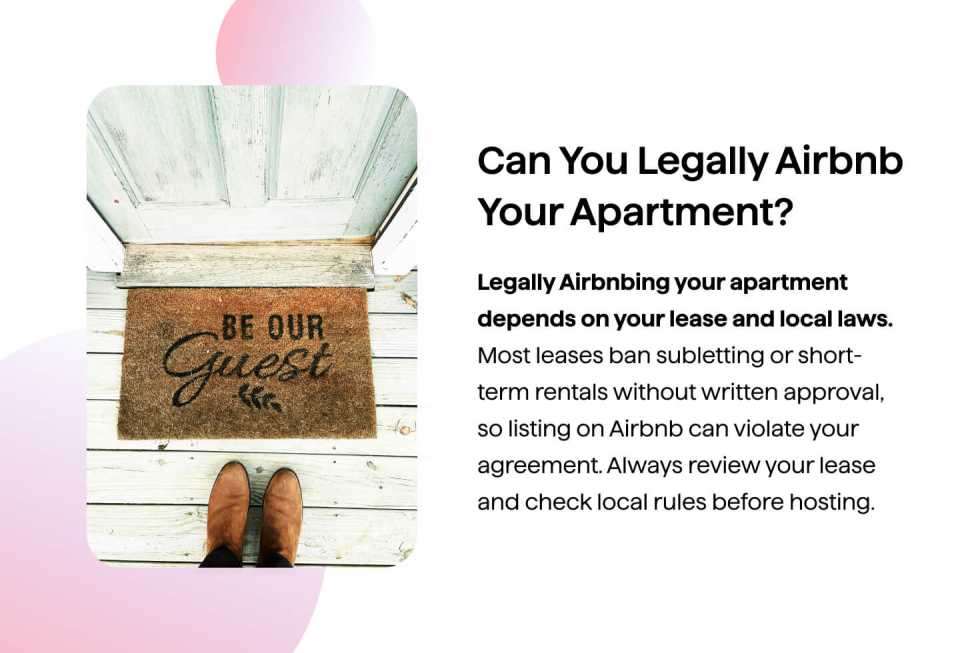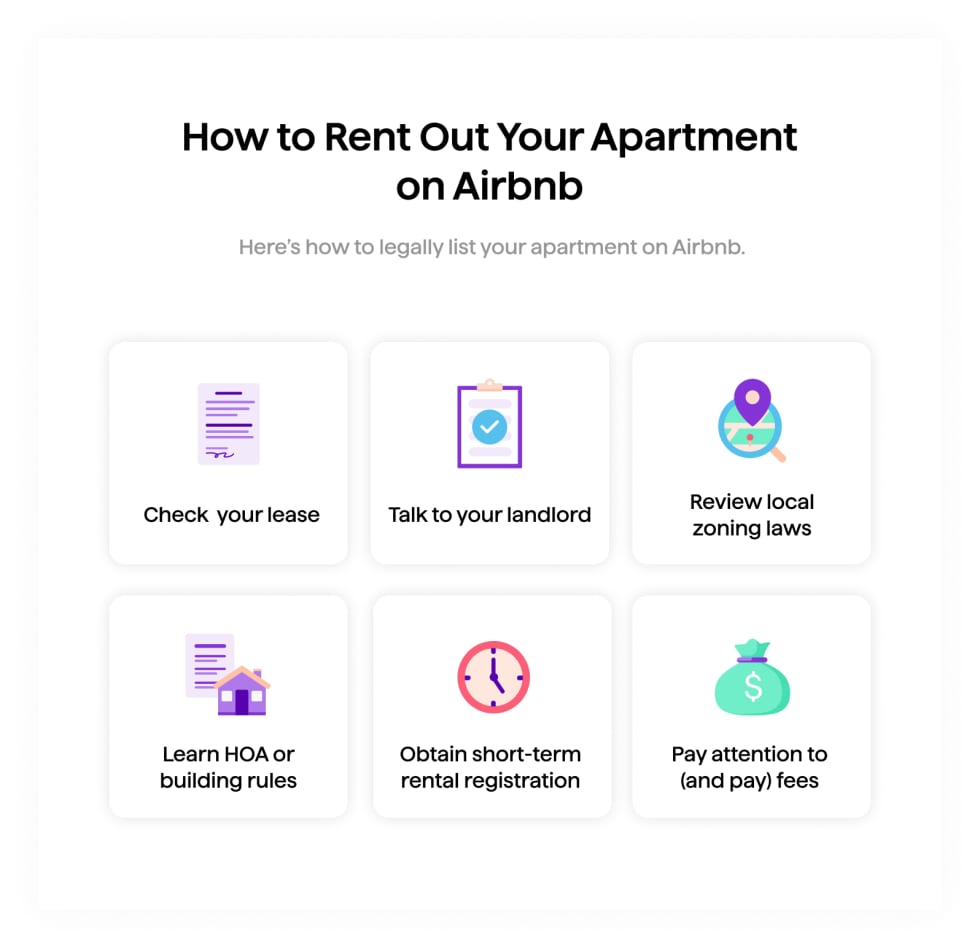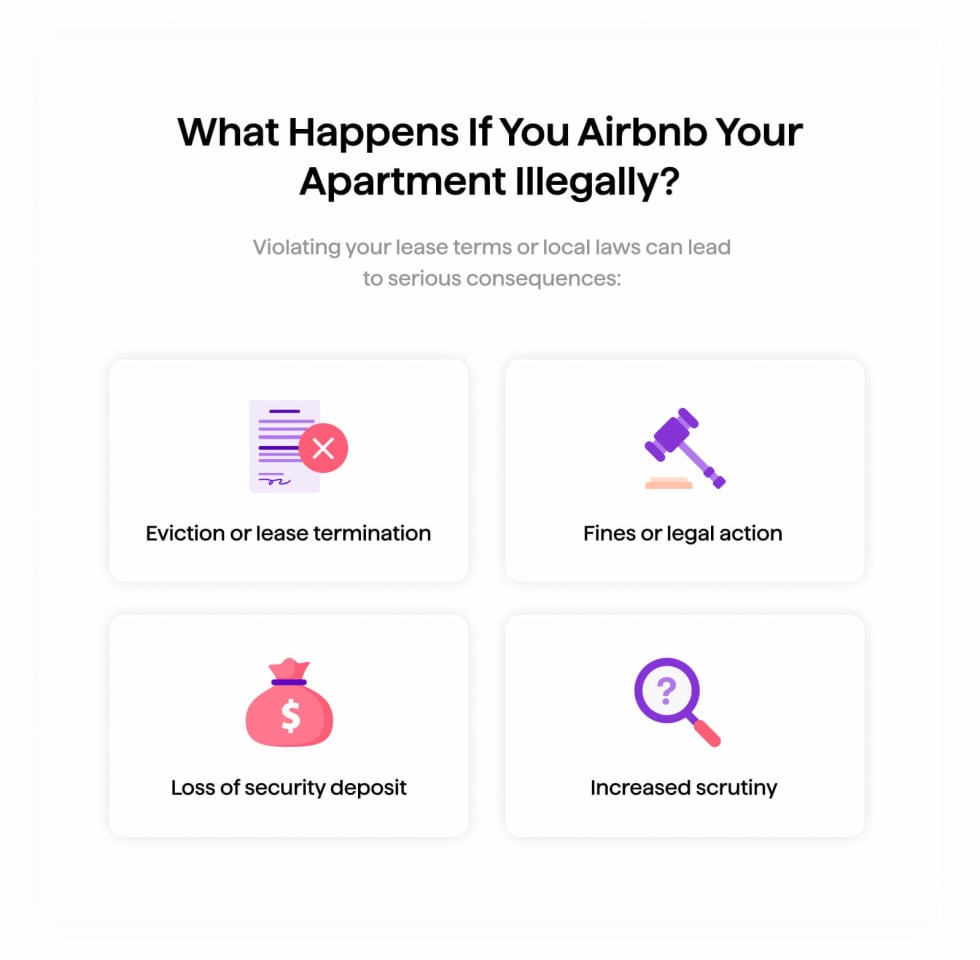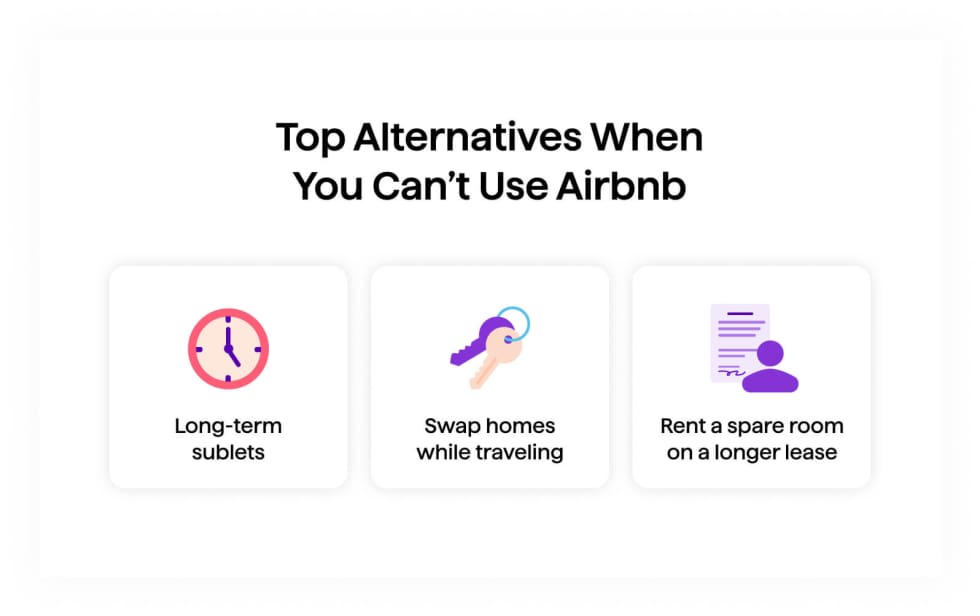- 44 units available
- 1 bed • 2 bed • 3 bed
- Amenities
In unit laundry, Hardwood floors, Dishwasher, 24hr maintenance, Stainless steel, Walk in closets + more

As rents soar across the country, many renters are looking for side hustles and asking the same question: “Can I Airbnb my apartment?”
The idea of renting out your unit while traveling—or even during the weekends—sounds like easy money to help ease your budget. But the legal realities and the content of your lease agreement may make it more complex.
Whether you want to earn a few hundred dollars as a part-time host or are aiming to replace your income with a full-time rental, here’s what every renter needs to know before listing their apartment on Airbnb.
Airbnb is an online platform with over 5 million users that lets people rent out their homes, apartments, or spare rooms to short-term guests. It serves as an alternative to hotels, offering travelers more personalized and often more affordable options.
As a host, you control the space, availability, and pricing. Whether it’s a private room or an entire unit, you can earn income by listing your rental—if your lease and local laws allow it. Just be aware that hosting on Airbnb comes with responsibilities, from handling guest communication to meeting local regulations.
“Can I rent my apartment on Airbnb?” Legally, it depends. Platforms like Airbnb make listing your apartment incredibly easy, but that doesn’t mean it’s legal or permitted in your lease.
Most rental agreements include clauses about subletting, guest policies, or commercial use of the space. If your lease or landlord doesn’t mention Airbnb or other vacation rental platforms by name, it likely still falls under the legal terms of a short-term rental or sublet and could violate your lease.
Even if your landlord doesn’t care what you do with your apartment or has minimal restrictions in your lease, local laws and building rules can hinder your ability to host.
Many cities, including Los Angeles, New York, and San Francisco, strictly prohibit or monitor short-term rentals. Their rules and regulations may limit the number of days you can host or ban the practice altogether. Some cities require official registration and permits.

A short-term rental, like an Airbnb, means renting your unit for a few days or weeks at a time—often to travelers. You stay on the lease and act as a host, managing bookings, cleanings, and guest reviews.
A private sublet, on the other hand, usually involves renting your place to someone else for a longer stretch (typically 30+ days), often with your landlord’s approval. You step back from daily involvement, and the subletter temporarily takes over your lease terms.
Airbnb rental arbitrage is when you lease a home, apartment, or room long term and then re-rent it short term on platforms like Airbnb—without owning the property. Your goal is to earn more from nightly stays than you pay in monthly rent.
You’re still a tenant, but you take on the role of a host—handling the listing, cleanings, guest communication, and platform logistics. If your lease and local laws allow it, this can be a flexible way to earn extra income.
Example: Let’s say you’re renting a one-bedroom in Austin. You’re going abroad for a month and don’t want to eat the rent. With landlord approval, you list your place on Airbnb while you’re away. Travelers book at your nightly rate, and the income you earn could offset your full rent—or even exceed it.
Listing your apartment on Airbnb for extra money is tempting, but not every rental is eligible for short-term hosting. Overlooking key restrictions could get you into legal or financial trouble.
Start by reviewing your lease carefully. Many rental agreements include clauses that prohibit subletting or using the property for short-term stays—even if Airbnb or vacation rentals aren't mentioned by name. Look for terms like “guest limitations,” “subleasing,” or “commercial activity.” These can all signal restrictions that would apply to Airbnb-style hosting.
Even if the lease language is vague, don’t assume you’re in the clear. Some leases require written permission for any non-tenant stays, while others limit the number of consecutive days a guest can stay. If you're unsure about a clause, it’s better to ask your property manager for clarification upfront than risk a lease violation later.
Learn whether short-term rentals are allowed in your city or neighborhood. Local zoning laws often dictate where and how properties can be rented out. Some cities restrict short-term rentals by zone, limit them to primary residences, or require a minimum stay length (like 30 nights). Others may ban short-term rentals in apartment buildings altogether.
Many cities now require hosts to register their unit, apply for a permit, or pass a safety inspection before listing. Some even cap the number of days you can rent per year. The best way to confirm what’s allowed is by visiting your city’s official website or searching for “[your city] short-term rental ordinance.” Don’t rely on word-of-mouth—these regulations change often and vary widely by location.
Even if your lease doesn’t explicitly ban short-term rentals, it’s smart (and often required) to get written permission from your landlord. Some landlords may be open to it if you present a clear plan—such as limiting rentals to weekends, screening guests carefully, or agreeing to additional terms like guest insurance or a larger security deposit.
Start the conversation early, and be upfront about how you’ll minimize disruption and protect the property. If your landlord agrees, get the approval in writing. If they decline, it’s best not to move forward. Violating your lease, even unintentionally, could lead to penalties or early termination.

If you live in a condo, co-op, or apartment with shared amenities, the homeowners association or building management may have their own rules. Some buildings ban Airbnb entirely, while others limit hosting to a few units. Always ask or review the bylaws.
Many cities require a permit, license, or registration number before you can legally list your unit on Airbnb. This often involves a fee, proof of residence, or safety inspection. Skipping this step could get your listing taken down—or fined.
Short-term rentals often come with extra costs: occupancy taxes, service fees, or special insurance. Some fees are local (like a city hotel tax), while others are platform-based. Make sure you understand the total costs so your earnings don’t disappear.
Legal compliance is just one part of successful Airbnb arbitrage. You may need to update your renters insurance, as most policies don’t cover short-term rentals. If you don’t purchase additional coverage, you may have to rely on Airbnb’s Host Guarantee, which, though better than nothing, doesn’t necessarily protect you in all situations. It’s important to stay fully aware of the risks before listing your apartment.
Airbnb regulations are a work in progress and change frequently, so check your own city, even if it's not on this list. Here’s a general idea of what you might expect:
Airbnb-friendly cities (with some regulations):
Cities with strict Airbnb laws:
Make sure to check the latest ordinances in your area, as these laws are subject to change. Start with your local government websites to learn more about short-term rental rules under housing or business licensing sections. In some cases, renting a room on Airbnb may be possible in these cities, but you may not be allowed to rent out your entire apartment.
Once you’re approved to host, it’s time to create your Airbnb listing. Follow these steps to make your apartment stand out and attract the right guests.
To start hosting, you’ll first need to create an Airbnb account. Go to airbnb.com, click “Airbnb your home,” and follow the prompts to sign up or log in. From there, the platform will guide you through the listing setup process.
Make sure to use your real name and accurate contact information—Airbnb requires identity verification for all hosts. Once your account is active, you’ll be able to manage your listing, communicate with guests, and track your earnings through the dashboard.
Once you’ve created your Airbnb account, you’ll be asked to fill out the core details of your rental. These fields help set guest expectations and determine whether your apartment will appear in the right search results. Be as accurate and specific as possible to avoid confusion and reduce back-and-forth messages later.
Key information to include:
These foundational details shape guest expectations, and in some cities, they’re also required for registration or permitting.
Your photos are the first impression guests get—so make them count. According to Airbnb, listings with professional photography can earn up to 20% more than others in the same area. If hiring a photographer isn’t in your budget, you can still showcase your apartment with well-lit, thoughtful images.
Tips for stronger listing photos:
Strong visuals help guests imagine themselves in your space—and can be the deciding factor between clicking away or booking.
Amenities can make or break a booking. Nearly 40% of renters say they're looking for better amenities in their next home—so it’s no surprise that travelers expect more too. Use your Airbnb description to highlight features that set your apartment apart and make it feel like a true home away from home.
Mention anything that adds comfort, convenience, or character, such as:
Focus on the features your apartment offers that guests might not have at home—and make them imagine how easy, relaxing, or fun their stay could be.
Your title is one of the first things guests see, and it can make the difference between a click and a pass. A great Airbnb title should highlight your apartment’s best features while staying within the 50-character limit.
Tips for crafting a strong title:
Think of your title like a headline. It should spark curiosity while clearly signaling what guests can expect.

Are you thinking about listing your apartment on Airbnb without permission? Violating your lease terms or local laws can lead to serious consequences:
What may seem like easy money can quickly turn into costly trouble—ignoring the rules isn’t worth the risk.
What if Airbnb or other short-term rental platforms aren’t an option for your situation? There are still ways to generate extra income or reduce your rent:
Each of these options still requires reviewing your lease and getting your landlord’s approval—but they could be an easier sell than listing on Airbnb.

“So, can I Airbnb my apartment?”
It all depends on your lease, your landlord’s point of view, and local laws. The potential for nearly passive income is mouthwateringly appealing, but remember, the legal risks are real. For a lucrative and stress-free experience, make sure you’re fully in the clear before jumping into Airbnb.
Maybe. Whether or not you can list your apartment on Airbnb will depend on your lease and your roommate agreement. Your roommates may need to approve any short-term renters. Even if you are legally able to list your apartment on Airbnb, consider whether or not your roommates want you to. Respect their decision or come up with a compromise.
Yes. Unless your lease agreement says otherwise, you will need your landlord’s written permission to host your apartment on Airbnb legally. You should always get everything in writing from your landlord—never rely on a verbal agreement about using Airbnb.
Yes, you can legally earn money on Airbnb, but only if your lease permits it. You also need to check that using Airbnb complies with all local ordinances and city and housing laws.
It’s a bad idea to list your apartment on Airbnb without your landlord’s permission. You could face eviction, lose your security deposit, and face legal consequences for violating your lease.
It is possible to use Airbnb and earn money without breaking any laws. Get written permission from your landlord, check city and local regulations, and double-check your lease agreement. Some cities may also require you to register your Airbnb as part of the legal process of using the platform.
Yes. Listing your Airbnb without permission usually comes with serious consequences. Unauthorized listings are grounds for eviction in many lease agreements and city ordinances.
No, in most cases you can’t legally Airbnb a rent-controlled apartment. These apartments are under strict regulations, and subletting of any kind can violate both your lease and local housing laws. If you list it on Airbnb anyway, you could end up with a fine, get evicted, or lose your coveted rent-controlled status.
Yes, you can usually rent out just one room on Airbnb, but the same rules still apply. You’ll need your landlord’s written permission and probably get consent from roommates. Local laws may also differentiate between renting a room and listing the entire unit, so check carefully before posting.
No, Airbnb won't tell your landlord or property manager when you list a room or your entire apartment on their platform. But that doesn’t mean your neighbors, building staff, or other tenants may not report it after they notice suspicious foot traffic or unfamiliar guests going in and out of your apartment.
If your lease doesn’t specifically address short-term rentals, you may still get into trouble. Most leases prohibit subletting or commercial activity without written consent from your landlord. It’s always best to get permission in advance.
Yes, there are some buildings, known as "Airbnb-friendly apartments," that are actually intended to accommodate short-term rentals. These buildings may partner with Airbnb and have specific units or guidelines for hosting legally. Other apartments or condos are owned privately, and those landlords may allow it for a share of the profit.
No. Airbnb will protect their guests and hosts using their platform, but they won’t protect you if you get evicted or face legal action because you violated your lease or local housing laws.
Yes, some cities will fine you for listing an unauthorized short-term rental on Airbnb. Some municipalities require a permit, registration number, or even a hotel tax. If you ignore these rules, you could end up paying hundreds or thousands of dollars. For example, New York City, Los Angeles, San Francisco, Boston, Honolulu, Washington, DC, Miami, Chicago, and Santa Monica all have Airbnb restrictions and steep fines in place.


In unit laundry, Hardwood floors, Dishwasher, 24hr maintenance, Stainless steel, Walk in closets + more
In unit laundry, Granite counters, Pet friendly, Stainless steel, Walk in closets, Gym + more